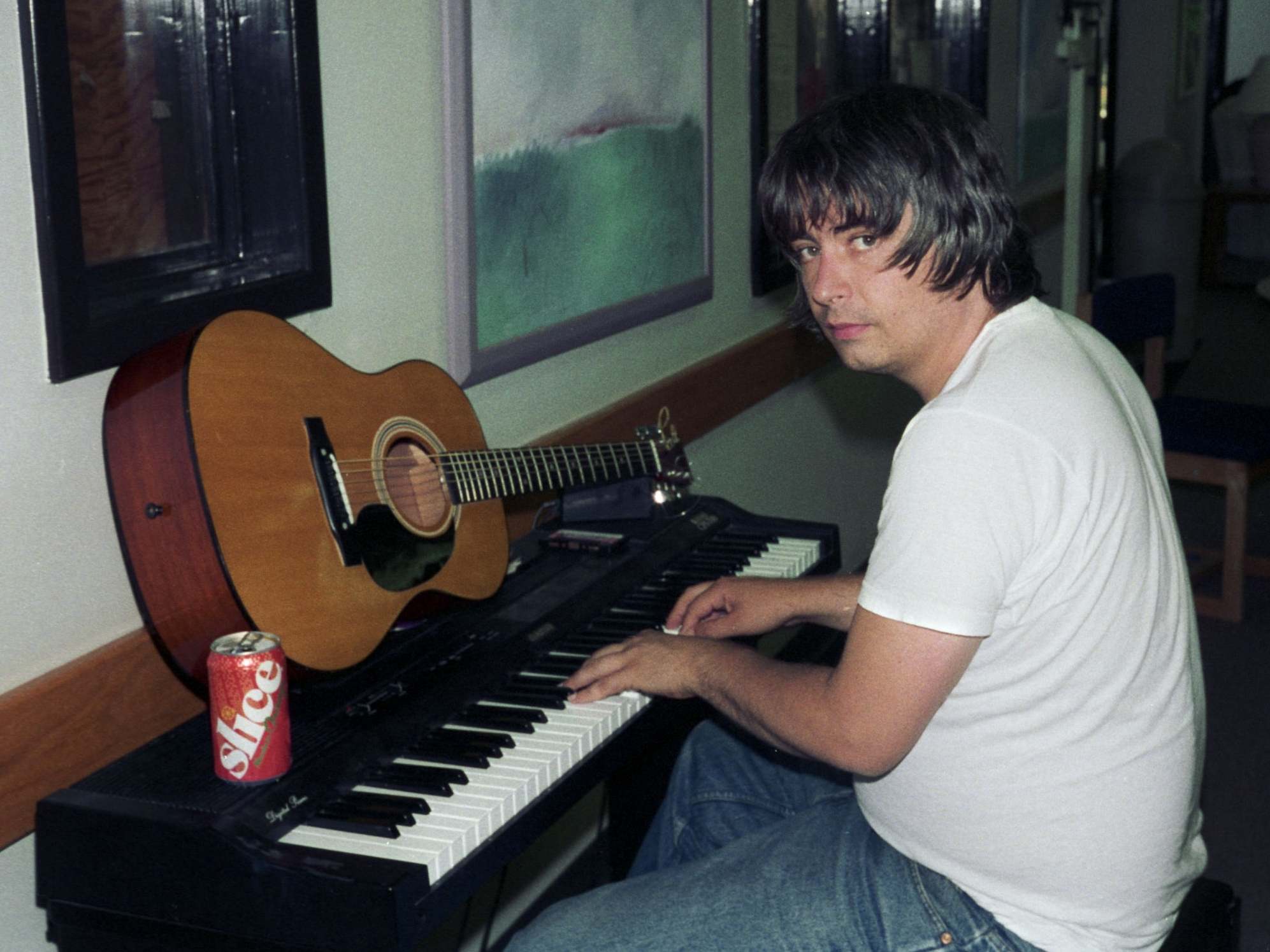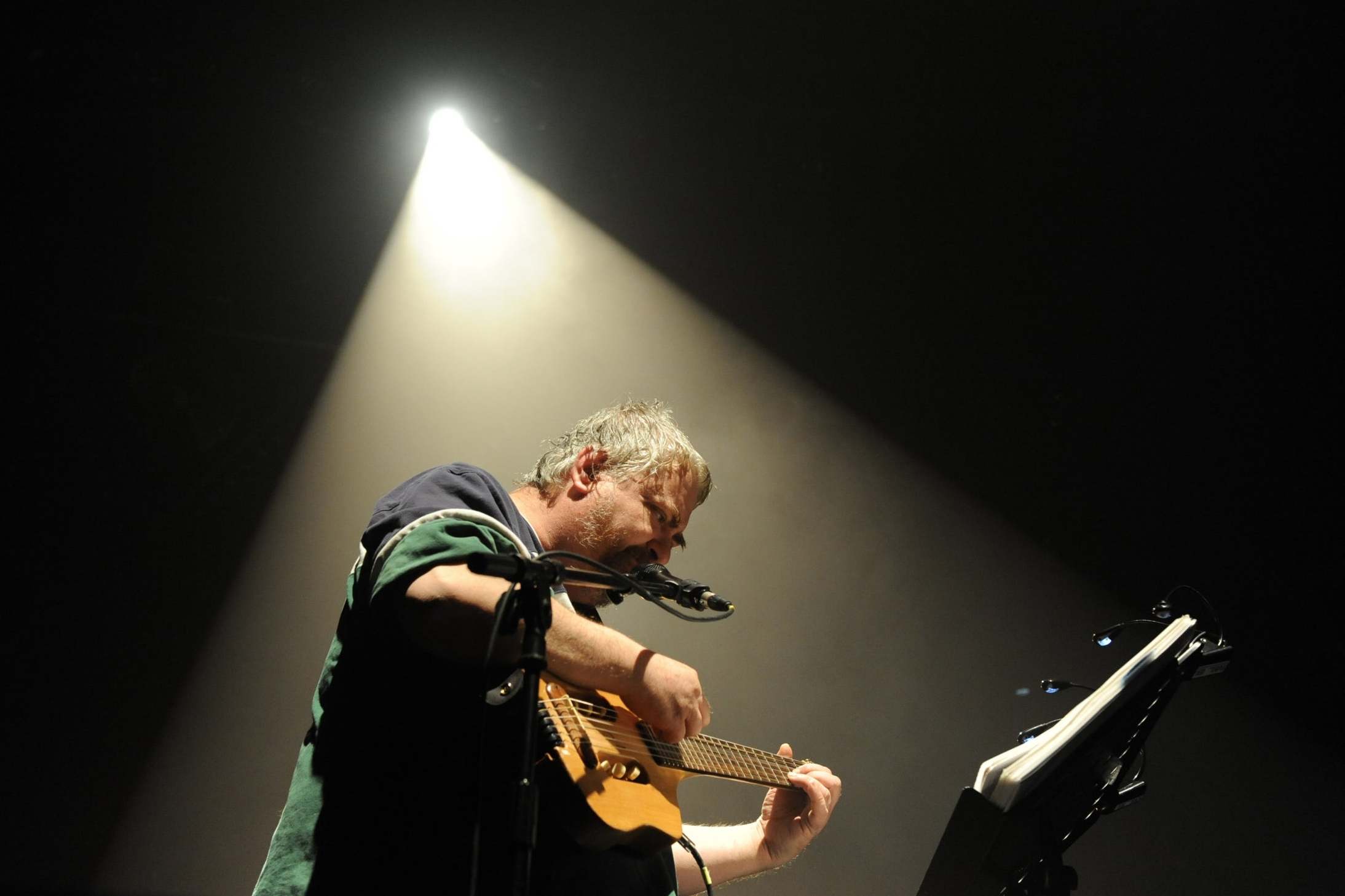Daniel Johnston: Enigmatic singer-songwriter who was the musical embodiment of the outsider artist
Revered and hugely influential, Johnston pioneered an intimate, uninhibited style on a vast trove of home-recorded songs

Daniel Johnston established his reputation as a near-mythical figure in indie rock through a vast canon of humorous, bittersweet songs, many recorded at home on cheap cassette, but his career was marked by struggles with mental health issues.
Johnston, who has died of a suspected heart attack aged 58, suffered with manic depression and schizophrenia and faced increasing health problems in recent years, notably diabetes and hydrocephalus, a build-up of fluid in the brain. Although he said he hoped to continue performing, he embarked in 2017 on what was billed as his final tour, joined by a backing band that included members of Wilco, Fugazi and Built to Spill – a roster of indie rock all-stars that spoke to his reputation as a master lyricist and intimate, uninhibited singer.
With a high-pitched voice and mild lisp, Johnston bared his soul in folksy songs about unrequited love, existential dread, his affection for The Beatles and the thrills of a speeding motorcycle. Emerging from Austin’s underground music scene in the mid-1980s, he used a $59 Sanyo boombox to record himself on acoustic guitar, organ and piano, and released cassette tapes decorated with his own ink and marker artwork.
His music was unabashedly simple and straightforward but drew a cult following, notably after Kurt Cobain of Nirvana was photographed in a T-shirt bearing the cover of Johnston’s album Hi, How Are You (1983). His songs – “recorded so intimately, it almost feels like an invasion to listen to them”, according to Pitchfork – were covered by, among others, Tom Waits, Beck and Lana Del Rey.
Johnston also found some success as an artist, inking cartoon-like drawings of an “alien frog” with eyes like lollipops, a boxer with a hollow head like an empty bowl, and Casper the Friendly Ghost. More than a dozen of his pictures were exhibited at the 2006 Whitney Biennial in Manhattan, after he had previously used his drawings to barter for comic books in Austin, or simply given them away.
But he never quite achieved the mainstream success that he said he wanted – only one of his approximately 20 full-length albums, Fun (1994), was released by a major label – and seemed at times to have a loose grasp on what fame he did receive. When asked whether he was planning to travel from Texas to New York for the Whitney show, he told a reporter he was “not in any condition to go overseas”.
For many years he was in and out of mental institutions and psychiatric wards, and lived with his elderly parents in Waller, working out of a garage filled with horror-movie posters, VHS tapes and comic books. He refused to sign with Elektra Records because he believed its band Metallica was trying to harm him, and addressed his mental-health issues in songs such as “Peek a Boo”, singing: “Junior high I lost my mind/ I don’t know why, it’s a terrible thing/ Since that day it’s been a struggle/ Trying to make sense out of scrambled eggs.”

Friends insisted he was no idiot savant, and Johnston himself expressed frustration at those who viewed his career solely in terms of mental illness. “Daniel knows exactly what he’s doing, and in a way he’s consciously exploited his mental illness,” Jeff Feuerzeig, director of the documentary The Devil and Daniel Johnston, said in 2005. “You look at his notebooks and there’s all these pictures of Van Gogh. You listen to his songs and it’s like he’s diagnosing himself out of the DSM4 psychology manual.”
The youngest of five children, Daniel Dale Johnston was born into a Christian fundamentalist family in Sacramento, California, in 1961. His mother worked on aeroplanes during the Second World War and his father was a fighter pilot turned engineer who occasionally flew his children on a private plane. (During one such flight in 1990, Johnston had a manic episode, taking the keys out of the ignition and throwing them out of the window. His father was able to land the plane without injury.)
The family moved to New Cumberland, West Virginia, when Daniel was young, and frequently gathered around the piano to sing church music. Daniel soon began banging out songs of his own, composing what he later described as “horror-movie themes” before singing more ambitious material while mowing the lawn as a teenager.
He recorded songs in the cellar and, after graduating from high school, attended occasional art classes across the Ohio River, at Kent State University at East Liverpool. He moved to Houston in 1983, worked as a ride operator at the AstroWorld amusement park, sold corn dogs in a travelling carnival and eventually settled in Austin, Texas, taking a job at McDonald’s before launching his music career.
While songs such as “True Love Will Find You in the End” and “Some Things Last a Long Time” have become much-covered staples of indie rock, Johnston said he was still trying to write a breakout song. “Hopefully, I could have a big hit someday, a real hit,” he said 2017. “I can’t stop writing. If I did stop, there could be nothing. Maybe everything would stop. So I won’t stop. I’ve got to keep it going.”
He is survived by a brother and three sisters.
Daniel Johnston, musician, born 22 January 1961, died 11 September 2019
© Washington Post
Join our commenting forum
Join thought-provoking conversations, follow other Independent readers and see their replies
Comments
Bookmark popover
Removed from bookmarks